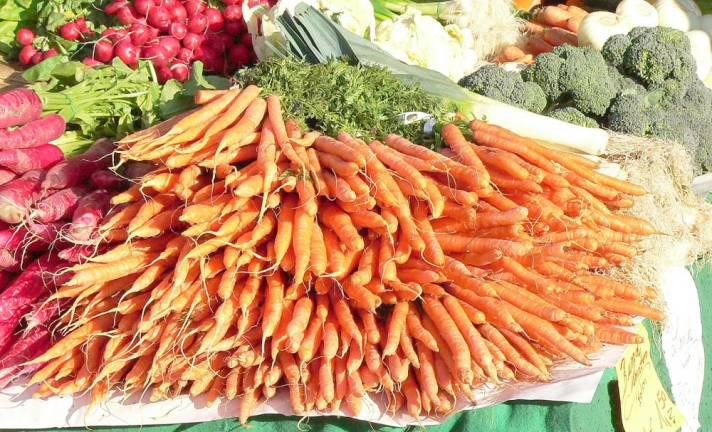Lakeside Farmers Markets concludes regular season
Greenwood Lake. Another fine season at the market

Having completed another season offering fresh fruits, vegetables, prepared foods, and artisan crafts to the community, the Lakeside Farmers Market is poised to begin planning for its 2025 season next year, after a remarkably successful year at Winstanley Park on Windermere Ave. in the village of Greenwood Lake.
The 2024 season was marked by the coincidental centennial celebration of Greenwood Lake becoming an incorporated village in the state, a series of fortuitous events (parades, historic auto shows, etc.) that were held on Saturdays when the farmers market was open, contributing to extra foot traffic and exposure to new audiences. The market also initiated a consistent list of live music performances that added a welcoming environment to guests. And a growing number of vendors also added to a wider selection of choices to shoppers looking to obtain unique offerings usually not found in the typical big-box supermarkets.
One of the unique aspects of the Lakeside Farmers Market was its collaboration with the Grow Local Greenwood Lake organization as a collection point for food waste to be used as compost. The U.S. discards nearly 60 million tons — 120 billion pounds — every year, the equivalent of 325 pounds of waste per person. In fact, food is the single largest component taking up space inside U.S. landfills, making up 22% of municipal solid waste (MSW). By composting this waste, however, it reduces valuable resources from entering the waste stream.
Composting reduces methane. Composting is the process of recycling food scraps and other organic matter and plays a pivotal role in reducing organic waste landfills. When organic materials like food scraps and yard waste end up in landfills, they decompose anaerobically, producing methane, a potent greenhouse gas that contributes to climate change.
Compositing facilitates the decomposition of organic matter in an aerobic environment, significantly reducing methane emissions. Composting also enriches soil health and fertility. The nutrient-rich compost created from organic waste contains valuable organic matter, microorganisms, and essential nutrients that enhance soil structure and provide a natural source of nourishment for plants. In addition to eliminating the need for synthetic fertilizers, which can have detrimental environmental impacts, composting improves soil water retention and reduces erosion, contributing to more resilient and sustainable agricultural systems.
Another unique aspect of the Lakeside Farmers Market is its collaboration with other community groups as a focal point for news and information about activities and events that have an impact on the entire village. Like the Cornell Cooperative Extension’s agricultural department, NASA’s information and education initiative, and the 5K run for the Greenwood Lake Skate Park initiative that is scheduled to begin construction in the near future, sharing the Winstanley Park space with other Village activities. In addition, community events like the recent Halloween festival and the upcoming holiday festival and tree lighting ceremony are all held at the same venue, further reinforcing the area as a de facto town square meeting place.
In August of this year, NYS Agriculture Commissioner Richard Ball announced that Greenwood Lake was among the local municipalities to win funding through the state’s Farmers’ Market Resiliency Grant Program. This was the second round of funding disbursements issued through the program this year. According to Ball’s announcement, the Village of Greenwood Lake won $22,665 to support food waste reduction via compost collection and to enhance marketing, outreach, and education efforts to increase the customer base and the number of specialty farmers and vendors. The project will also increase food access for the ALICE (Asset Limited, Income Constrained, Employed) population through an expanded Market Bucks program.
Toward the end of the season, organizers initiated a customer survey to determine feedback from visitors about ways in the market could be enhanced. More than 100 visitors responded to the survey whose details will be evaluated and tabulated later this month.
Market manager Karen Wintrow expressed a genuine thank you to all the vendors for their participation this year. “We are thrilled with the results of this season, the number of new and returning vendors, and the sustained support from the Village of Greenwood Lake, without whose involvement the market would not be possible. The increase in foot traffic this season during the market hours (9 a.m. to 1 p.m.) was an indication of the important role that farmers markets play in the community,” she said, “and we look forward to another successful season in Greenwood Lake when the market reopens in June of 2025.”
During 2024 the Lakeside Farmers Market (VillageofGreenwoodLake.org/lakeside-farmers-market) featured a number of local farms, orchards, as well as producers of prepared foods and artisan wares. The produce and fruit presented by the vendors ripen naturally on the vine or in the soil and do not spend any time in plastic containers or shrink wrap, trying to ripen in transit. They are full of nutrients because they are delivered to the market within hours of being picked. The vendors were able to answer visitor questions about the source of all the ingredients used for baked goods and prepared foods.